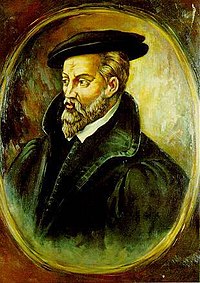G. Agricola
| Georgius Agricola | |
|---|---|

Georgius Agricola
|
|
| Born |
Georg Pawer 24 March 1494 Glauchau |
| Died |
21 November 1555 (aged 61) Chemnitz |
| Citizenship | German |
| Scientific career | |
| Fields | Mineralogy |
Georgius Agricola (/əˈɡrɪkələ/; 24 March 1494 – 21 November 1555) was a German Catholic, scholar and scientist. Known as "the father of mineralogy", he was born at Glauchau in Saxony. His birth name was Georg Pawer (Bauer in modern German);Agricola is the Latinized version of his name, by which he was known his entire adult life; Agricola and Bauer mean "farmer" in their respective languages. He is best known for his book De Re Metallica (1556).
Gifted with a precocious intellect, Agricola early threw himself into the pursuit of the "new learning", with such effect that at the age of 20, he was appointed Rector extraordinarius of Greek at the so-called Great School of Zwickau, and made his appearance as a writer on philology. After two years, he gave up his appointment to pursue his studies at Leipzig, where, as rector, he received the support of the professor of classics, Peter Mosellanus (1493–1525), a celebrated humanist of the time, with whom he had already been in correspondence. Here, he also devoted himself to the study of medicine, physics, and chemistry. After the death of Mosellanus, he went to Italy from 1524 to 1526, where he took his doctor's degree.
He returned to Zwickau in 1527, and was chosen as town physician at Joachimsthal, a centre of mining and smelting works, his object being partly "to fill in the gaps in the art of healing", and partly to test what had been written about mineralogy by careful observation of ores and the methods of their treatment. His thorough grounding in philology and philosophy had accustomed him to systematic thinking, and this enabled him to construct out of his studies and observations of minerals a logical system which he began to publish in 1528. Agricola's dialogue Bermannus, sive de re metallica dialogus [Bermannus; or a dialogue on metallurgy], (1530) the first attempt to reduce to scientific order the knowledge won by practical work, brought Agricola into notice; it contained an approving letter from Erasmus at the beginning of the book.
...
Wikipedia
